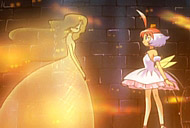
Princess Tutu Vol. 1
I don't much like tutus. I don't really think all that much of princesses, either, since they always seem to need rescuing. And magical girl shows are not my specialty -- I'll admit that I'd rather sit through an intelligent sci-fi drama, if given the choice, than one more show about a gaggle of girls who discover themselves and fight for truth, justice, and the Japanese way. That's why Princess Tutu sat on my shelf for months, never being dropped in the player for a spin. In fact, had it not been for the controversy surrounding the huge delay of the second volume and the friendly prodding of a PR rep, I'm sure it would have stayed on the "when I get to it" stack for a very long time.
And you know what? Despite a few nods to the standards of the genre, the first volume of Princess Tutu is utterly engaging. Yes, I had to get past little girls dancing and the occasionally obnoxious rantings of the lead character. But for everything borrowed there's something completely different; for every nod to an old story, there are surprising new developments that take this story way past "magical girl ballet in fantasyland" into innovative territory.
Our lead character, Duck, is a duck. More properly speaking, she's a human girl who used to be a duck but for mysterious reasons is one no longer. A goofy and scatterbrained ballet dancer, she still has a pure heart. She's fallen into first love with a young prince named Mythos, but he's dating the older beauty Rue. It seems he's not exactly in love with Rue, though...in fact, it doesn't seem that he has much emotion about anything. Perhaps it's because of the maliciously controlling Fakir who seems to have a vested interest in keeping Mythos down. Or maybe there's something else.
As it turns out, several of the characters are interrelated to a yarn told about their town long ago that is coming to life. The story, "The Prince and the Raven," was not completed; its author, Drosselmeyer, passed away before he was able to finish the tale, and the unfinished writings were published years ago. But strange things are afoot when the long-since-dead Drosselmeyer shows himself to Duck! He is behind her ability to transform not only into human form but also into the beautiful Princess Tutu. As Princess Tutu, Duck becomes able to start unlocking the mystery behind Mythos' passionless heart. But there's a price to be paid: as the story goes, the one who truly loves the prince will never be able to share herself with him, but will disappear into nothingness when she confesses her love. Duck will have to manage her three-fold life as a tiny bird, an unsure little girl, and a magical princess if she is to help release Mythos from his personal prison of the soul.
Princess Tutu is a fine-looking series with sharp animation for a television program. At times, I wished that the dancing was a little more fluid, since it is a central premise within the show; however, to have done so would have required a far bigger budget than a show like this could probably ever receive. Overall, though, it has a great look. In keeping with the thematic structure of the show, instead of a modern soundtrack, almost all the music is classical, including some very recognizable pieces virtually anyone who's taken basic music appreciation will have heard. If you've ever thought that music can make a show, you're right -- the effect in Princess Tutu makes for an experience almost completely unlike anything else in the anime market. If I'm not a big magical girl fan, I'm not a big classical fan either, but here it works extremely well, and I enjoyed the soundtrack thoroughly.
I'm going to get my few objections out of the way quickly for those who are still on the fence about what is at one level a very girly show. First, Duck's character can go into fits of frenzy that are supposed to be manically funny. Problem is, I've seen this hyper-spaz routine so much in anime as of late that it didn't quite work for me. It also connects to her "unsure of myself" personality that I've seen too often. Second, Duck's two friends are unnecessary and sterile as characters; they don't really help move anything along. Finally, there's the transformation sequence. I know Duck has to turn into Princess Tutu, and I know the genre calls for it, but the recycled animation of her transformation process in every episode gets old. None of these issues are major, but I couldn't help but notice them here. In a show that does so many things right, the few it misses are more apparent.
But make no mistake, Princess Tutu gets an awful lot right. In many ways, it gets right what I saw wrong in Mythical Detective Loki Ragnarok, a show that has many of the same concepts but blew its chance with me very quickly. For one, Duck (with her faults) is still a likable character who you want to see succeed, and the fact that her story may be destined to end unhappily makes us constantly curious of where the plot will head. Second, the world of European storytelling is respected yet not taken for granted. The roots of the tale in the Continent are obvious, but Princess Tutu takes the basic groundwork and makes some appealing changes to keep the audience off-guard, whether it's with having animal characters appear side by side with humans or by twisting a familiar tale just enough to keep it interesting. What's more, the idea of the old grandfatherly narrator is tossed on its ear by the machinations of Drosselmeyer, who's not only an enigma but also a truly creepy character. Most importantly, even in just five episodes, we've started to see character growth. Duck is not in episode 5 who she was in episode 1, and neither is Mythos. If this kind of work continues, the show will likely even get better than its impressive starting point.
Also of note is the dub version of the title. When given the chance, I typically watch subs, but after hearing Duck's voice in the original, I had to wonder how the English version worked. To be frank, Luci Christian (the English voice actor for Duck) nails the part. In fact, her performance gives the character a more grounded sense than the Japanese version, despite its high tenor. Since I found Duck a little irritating in the Japanese at times, I enjoyed that Ms. Christian's performance made the character more endearing. The other English performances were good, but Ms. Christian's was superb enough to make even a sub fan take note. Also, even if you just watch the subs, the English-language outtakes in the bonus section are absolutely hysterical; I laughed so hard a couple of times I had to stop the disc and rewind it, since I'd missed the next couple of punchlines.
The opening of Princess Tutu was quite a surprise. For a show that contains many of the things I avoid in my anime watching, it was quite good. It's receiving an A- not because of any inherent weakness in the program, but because the opening few episodes take a hit from Duck's character being too over-the-top. That said, if it develops from here -- and we'll find out if it does soon, as the second volume finally hits shelves -- Princess Tutu could be a top-tier title.
Princess Tutu Vol. 1 -- mild violence, non-sexual hints of nudity -- A-

